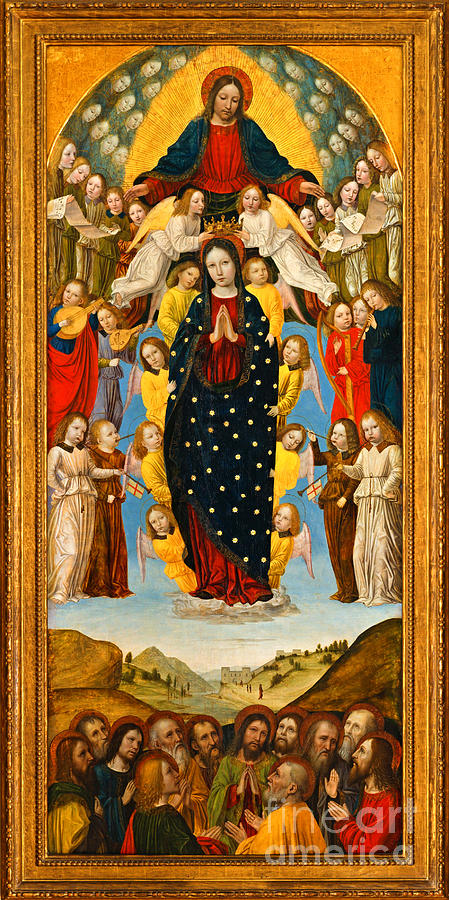
Vespers: Fr. Vittorio Genovesi, S.J.
O prima, Virgo, pródita
E Conditóris spíritu,
Prædestináta Altíssimi
Gestáre in alvo Fílium;
Tu perpes hostis fémina
Prænuntiáta dæmonis,
Oppléris una grátia
Intamináta orígine.
Tu ventre Vitam cóncipis,
Vitámque ab Adam pérditam,
Diæ litándæ Víctimæ
Carnem minístrans, íntegras.
Merces piáclo débita
Devícta mors te déserit,
Almíque consors Fílii
Ad astra ferris córpore.
Tanta corúscans glória,
Natúra cuncta extóllitur,
In te vocáta vérticem
Decóris omnis tángere.
Ad nos, triúmphans, éxsules,
Regína, verte lúmina,
Cæli ut beátam pátriam,
Te, consequámur áuspice.
Jesu, tibi sit glória,
Qui natus es de Vírgine,
Cum Patre et almo Spíritu,
In sempitérna sæcula.
Amen.
O Virgin thou, the spirit's fair’st,
Predestined by the will divine,
Within thy sacred womb thou bear’st
His only Son, and also thine.
O thou in whom rich grace abounds,
Foretold thou wast to be the foe
Who in her origin confounds
The wicked demon here below.
Within thy womb anew Life's made,
The very life by Adam lost
Hath been renewed by thee, sweet maid,
Who didst provide the holocaust.
Thy will immersed in Jesu's own,
Atoning for the sins of all,
He raiseth thee to Heaven's throne,
In victory o'er death's dread thrall.
In thy great glory burning bright
Exalted nature sings the praise,
And unto beauty's very height,
Dost honour and all glory raise.
Triumphant Queen to Heaven borne,
Upon us exiles turn thy sight,
That to the ever-blessed morn
We may be guided by thy light.
All honor, laud, and glory be,
O Jesu, Virgin-Born, to thee;
Whom with the Father we adore,
And Holy Ghost, for evermore.
Amen.
Matins: Fr. Vittorio
Genovesi, S.J.
Surge! Iam terris fera bruma cessit,
Ridet in pratis decus omne florum,
Alma quæ Vitæ Genitrix fuisti,
Surge, Maria!
Lilium fulgens velut in rubeto,
Mortis auctorem teris una, carpens
Sontibus fructum patribus negatum
Arbore vitæ.
Arca non putri fabricata ligno
Manna tu servas, fluit unde virtus,
Ipsa qua surgent animata rursus
Ossa sepulcris.
Præsidis mentis docilis ministra,
Haud caro tabo patitur resolvi;
Spiritus imo sine fine consors
Tendit ad astra.
Surge! Dilecto pete nixa cælum,
Sume consertum diadema stellis,
Teque natorum recinens beatam
Excipe carmen.
Laus sit excelsæ Triadi perennis,
Quæ tibi, Virgo, tribuit coronam,
Atque reginam statuitque nostram
Provida matrem. Amen.
Rise up! the misty chill has left the meadows;
Now, as they put their liveliest blossoms forward,
Thou, who hast been to Life himself a mother,
Rise up, O Mary.
Fair, as a lily blooming among brambles,
Thou, though unaided, crushing death's inventor,
Fruit from the tree of life denied our fathers
Gatherest for us.
Ark built of wood not subject to corruption,
Thine to conserve the Manna by whose virtue
Dry bones re-edified in living sinew
Rise from their graveyards.
Thy flesh, in all things docile to thy ruling
Spirit, defying final dissolution,
Now as thy soul's inseparable consort
Rises to heaven.
Rise up! and seek the arms of thy Belovéd,
Take thou thy crown of stars at his awarding
And when thy children sing thy benedictions
Hear us with favor.
Christ's in the height be glory never ending,
Offspring of holy Mary ever virgin,
Who with the Father and Spirit co-equal
Reigns to all ages. Amen.
Lauds/Vespers : Jean-Baptiste de Santeul ,
17th C: Jean-Baptiste
de Santeul entered the Abbey of St. Victor, Paris, in 1653, and made his
profession the next year. He was a respected poet in the Latin language,
writing under the name of Santolius Victorinus. Santeul also wrote hymns, many
of which were published in the Cluniac Breviary of 1686, and the Paris
Breviaries of 1680 and 1736. His Hymni Sacri et Novi were published at Paris in
1689. An enlarged version was published in 1698. A number of his hymns were
translated into English. De Santeul was the author of the Latin phrase
castigat ridendo mores, meaning "laughter corrects customs".
O vos, ætherei plaudite cives,
Hæc est illa dies clara triumpho,
Qua matrem placida morte solutam
Natus siderea suscipit aula.
Quæ non, Virgo, tibi dona rependit!
Cæli divitias explicat omnes,
Verbum vestieras carne; vicissim
Te Verbum proprio lumine vestit.
Qui velo latuit carnis, aperti
Pleno te satiat Numinis haustu:
Et quem virgineo lacte cibasti,
In iugem tibi dat se Deus escam.
O concessa tibi quanta potestas!
Per te quanta venit gratia terris!
Cunctis cœlitibus celsior una,
Solo facta minor, Virgo, Tonante.
Quæ Regina sedes proxima Christo,
Alto de solio vota tuorum
Audi; namque potes flectere Natum,
Virgo Mater: amas nos quoque natos.
Divinæ Soboli, qui dare matrem
In terris voluit, gloria Patri:
Cuius virgo parens, gloria Nato;
Quo fœcunda, tibi gloria, Flamen. Amen.
Sing, you who dwell in the kingdom of heaven!
This anniversary marks a great triumph:
Death's gentle transit accomplished, a mother
Hears her son welcome her into his kingdom.
Virgin, what gifts shall he not lavish on thee?
He deploys all the resources of heaven.
Thine was to clothe God in flesh; and now likewise
God in his own divine splendor shall clothe thee.
Formerly veiled in the flesh, God the Word now
Satisfies thee with full vision of Godhead;
He who once fed on thy virginal milk now
Feeds thee with bread of himself God of heaven.
What immense power is conferred on thee by him!
What immense grace is conferred on earth by thee!
Higher preferred than all dwellers in heaven,
Less than the Thunderer only, O Virgin.
Queen enthroned next to the Lord, hear thy people
Praying to thee where thou reignest in heaven;
Thou canst prevail on thy First-born, O Virgin
Mother, and lovest us also thy children.
Hail to the Father Who willed his divine Son
Take flesh on earth and assigned him a mother,
Hail to the Son who was born of a virgin,
Hail to the Spirit who caused her conception.
Amen.
No comments:
Post a Comment